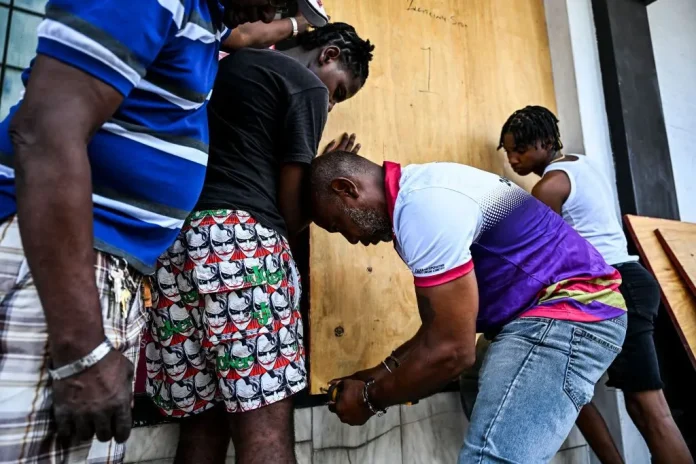Hurricane Beryl has wreaked havoc across several Caribbean countries, claiming at least one life and leaving thousands without power or adequate shelter in St Vincent and the Grenadines, Grenada, and St Lucia. The storm intensified rapidly, reaching Category 5 status as it moves westward towards Jamaica and is forecasted to impact southeastern Mexico by week’s end. Images circulating on social media depict homes with roofs torn off and residents sifting through debris to salvage belongings, underscoring the widespread devastation left in its wake.
Grenada’s Prime Minister, Dickon Mitchell, described the swift and devastating impact on Carriacou Island, stating, “In half an hour, Carriacou was flattened.” Ralph Gonsalves, Premier of St Vincent and the Grenadines, confirmed one fatality and warned of potential further casualties. Airports and businesses preemptively closed, and residents were urged to seek refuge as the storm approached, reflecting the seriousness of the threat posed by Hurricane Beryl.
Maximum sustained winds near 150 mph (241 km/h) were recorded as the storm moved westward, prompting a hurricane watch for Jamaica with expected hurricane conditions by midweek. Ralph Gonsalves stressed the gravity of the situation, recalling past hurricane devastations and emphasizing the need for preparedness. Taking precautionary measures himself, he sought shelter in his basement, wary that the storm’s force could compromise even sturdy structures.
Initially upgraded to Category 4 status before slightly weakening, Hurricane Beryl has posed significant risks to the Windward Islands, particularly St Vincent and the Grenadines and Grenada, which are most vulnerable to severe wind damage. Hurricane shelters were opened in anticipation of the storm’s arrival, providing crucial safe havens for those in affected areas.
The National Oceanic and Atmospheric Administration (NOAA) warned of an active hurricane season in the North Atlantic, predicting up to seven major hurricanes, fueled in part by record-high sea surface temperatures. Meteorologists highlighted Hurricane Beryl’s rapid intensification from a tropical depression to a Category 3 or higher hurricane within just 42 hours, underscoring the unpredictable nature of such storms.
Communities throughout the region heeded evacuation orders and prepared for the worst, with widespread closures of shops and stocking up on essentials. Grenada declared a state of emergency, while St Lucia implemented a “national shutdown,” closing schools and businesses to mitigate risks associated with the storm’s impact.
As Hurricane Beryl approached, journalists Colvin Harry and Dionne John found themselves broadcasting live on St Vincent and the Grenadines’ National Broadcasting Corporation, witnessing firsthand the storm’s approach. Faced with escalating winds and collapsing infrastructure nearby, they were forced to evacuate their studio for safer surroundings, highlighting the precarious conditions faced by residents and reporters alike.
The unprecedented intensity of Hurricane Beryl has raised concerns about the region’s vulnerability to increasingly powerful storms, exacerbated by warming ocean temperatures linked to human activity. These conditions have amplified the frequency and strength of hurricanes like Beryl, capable of inflicting severe wind damage, dangerous gusts, and heavy rainfall across Caribbean islands.
Despite efforts to prepare, including boarding up homes and securing essential supplies, the storm’s impact has been profound. Some smaller islands, such as Carriacou and Petit Martinique in Grenada, have already lost communication networks, complicating efforts to assess damages and respond effectively.
The immediate focus remains on monitoring Hurricane Beryl’s trajectory and minimizing its toll on affected nations. Yet, concerns persist about the broader implications for the Atlantic hurricane season, with forecasts suggesting heightened activity and potential for further destructive storms. Hurricane Beryl’s swift development and impact serve as a stark reminder of the region’s vulnerability and the critical need for robust disaster preparedness and response measures moving forward.























